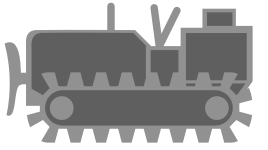Equipment operator
Equipment Operator
An equipment operator is a skilled professional responsible for operating, controlling, and maintaining heavy machinery and equipment used in construction, manufacturing, transportation, and other industries. These operators play a crucial role in ensuring the efficient and safe execution of various tasks that require precision and expertise. The range of equipment they may handle includes bulldozers, cranes, excavators, forklifts, and backhoes, among others. This article delves into the responsibilities, required skills, and training pathways for becoming an equipment operator.
Responsibilities[edit | edit source]
The primary responsibilities of an equipment operator include:
- Operating heavy machinery in accordance with project requirements and safety standards.
- Performing routine maintenance checks and minor repairs to ensure equipment functionality and safety.
- Coordinating with other construction professionals to ensure tasks are completed efficiently and effectively.
- Adhering to environmental regulations and procedures to minimize the impact of operations on the environment.
- Reading and interpreting site plans and work orders to determine the equipment and resources required for the task at hand.
Skills and Qualifications[edit | edit source]
To become a successful equipment operator, individuals must possess a combination of technical skills, physical abilities, and personal traits, including:
- Proficiency in operating various types of heavy machinery.
- Strong understanding of safety protocols and regulations.
- Good communication and teamwork skills.
- Ability to read and interpret construction plans and documents.
- Physical fitness and the ability to work in various weather conditions.
Formal qualifications may vary by region and employer, but they typically include a high school diploma or equivalent, along with specialized training or certifications related to heavy equipment operation.
Training and Certification[edit | edit source]
Training to become an equipment operator can be obtained through vocational schools, community colleges, apprenticeship programs, or on-the-job training. These programs often cover topics such as equipment maintenance, safety procedures, and basic operational techniques. Additionally, many regions require equipment operators to obtain certification or licensing to legally operate heavy machinery. This process usually involves completing a training program, gaining a certain amount of practical experience, and passing a proficiency examination.
Career Outlook[edit | edit source]
The demand for skilled equipment operators is driven by the needs of the construction, mining, and transportation industries. According to employment projections, the job outlook for equipment operators is expected to grow at a steady pace, with new opportunities arising from infrastructure development projects and the replacement of retiring workers. Advancements in technology also necessitate continuous learning and adaptation to new equipment and operational methods.
See Also[edit | edit source]
| Equipment operator Resources | ||
|---|---|---|
|
| |
Translate to: East Asian
中文,
日本,
한국어,
South Asian
हिन्दी,
Urdu,
বাংলা,
తెలుగు,
தமிழ்,
ಕನ್ನಡ,
Southeast Asian
Indonesian,
Vietnamese,
Thai,
မြန်မာဘာသာ,
European
español,
Deutsch,
français,
русский,
português do Brasil,
Italian,
polski
Navigation: Wellness - Encyclopedia - Health topics - Disease Index - Drugs - World Directory - Gray's Anatomy - Keto diet - Recipes
Search WikiMD
Ad.Tired of being Overweight? Try W8MD's physician weight loss program.
Semaglutide (Ozempic / Wegovy and Tirzepatide (Mounjaro / Zepbound) available.
Advertise on WikiMD
WikiMD is not a substitute for professional medical advice. See full disclaimer.
Credits:Most images are courtesy of Wikimedia commons, and templates Wikipedia, licensed under CC BY SA or similar.Contributors: Prab R. Tumpati, MD


